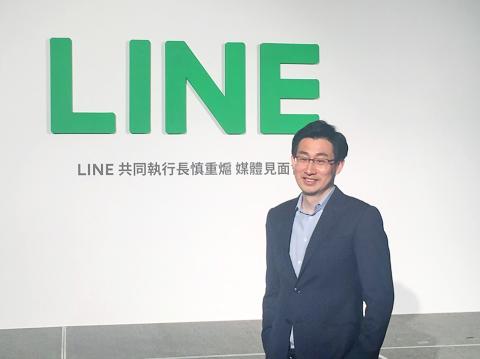Over next three years, Line Corp plans to invest NT$3 billion (US$97.02 million) in Taiwan, as it aims to expand into areas such as financial technology, e-commerce and digital content, co-CEO Jungho Shin told a news conference in Taipei yesterday.
It would be another significant investment in Taiwan for the Tokyo-based firm after its subsidiary, Line Financial Corp, invested NT$4.82 billion in Line Financial Taiwan Corp (台灣連線金融科技) in March in a bid to launch the Web-only Line Bank in Taiwan.
Line Financial Taiwan holds a 49.9 percent stake in Line Bank, which would cost the firm NT$4.99 billion if the Financial Supervisory Commission (FSC) grants it the license later this year.

Photo: Liao Chien-ying, Taipei Times
“The Taiwanese market is a great investment environment, as people embrace new technologies and there are many talented people who can help us develop digital innovations,” Shin said.
The firm plans to introduce new services in Taiwan over the next three years and would expand them into other markets if they prove successful, he said.
Line Corp does not have the largest user base in Taiwan, but Taiwanese consumers understand the company’s messaging and other services best, which made Line Corp think it would be a good idea to test its other services in the nation, Shin said.
“I am often surprised at Taiwanese users who have always been willing to give feedback on our new services,” he said.
The firm’s electronic payment service, Line Pay, has achieved huge success in Taiwan, with the number of users totaling 6.04 million and the number of shops using the tool surpassing 120,000 as of Wednesday last week, Shin said.
“The way Line Pay has been promoted here has become a model for our marketing teams in other countries,” Shin said.
Line Taiwan Ltd (台灣連線) would spend the NT$3 billion investing in business partners, expanding its businesses and recruiting more employees, Shin said.
Line, which started as a communication software provider, but gradually expanded into e-commerce and mobile payments, believes artificial intelligence and fintech to be the fields with the most potential, Shin said.
The firm would consider investing in start-ups or signing mergers and acquisitions with companies in the two sectors, he said.
The firm’s new services, including Line Bank, Line Music and Line TV, would also be expanded, while the company would recruit more talent, he said.
Line Corp is a subsidiary of South Korean Internet search giant Naver Corp.

Taiwanese suppliers to Taiwan Semiconductor Manufacturing Co. (TSMC, 台積電) are expected to follow the contract chipmaker’s step to invest in the US, but their relocation may be seven to eight years away, Minister of Economic Affairs J.W. Kuo (郭智輝) said yesterday. When asked by opposition Chinese Nationalist Party (KMT) Legislator Niu Hsu-ting (牛煦庭) in the legislature about growing concerns that TSMC’s huge investments in the US will prompt its suppliers to follow suit, Kuo said based on the chipmaker’s current limited production volume, it is unlikely to lead its supply chain to go there for now. “Unless TSMC completes its planned six

Intel Corp has named Tasha Chuang (莊蓓瑜) to lead Intel Taiwan in a bid to reinforce relations between the company and its Taiwanese partners. The appointment of Chuang as general manager for Intel Taiwan takes effect on Thursday, the firm said in a statement yesterday. Chuang is to lead her team in Taiwan to pursue product development and sales growth in an effort to reinforce the company’s ties with its partners and clients, Intel said. Chuang was previously in charge of managing Intel’s ties with leading Taiwanese PC brand Asustek Computer Inc (華碩), which included helping Asustek strengthen its global businesses, the company

Power supply and electronic components maker Delta Electronics Inc (台達電) yesterday said second-quarter revenue is expected to surpass the first quarter, which rose 30 percent year-on-year to NT$118.92 billion (US$3.71 billion). Revenue this quarter is likely to grow, as US clients have front-loaded orders ahead of US President Donald Trump’s planned tariffs on Taiwanese goods, Delta chairman Ping Cheng (鄭平) said at an earnings conference in Taipei, referring to the 90-day pause in tariff implementation Trump announced on April 9. While situations in the third and fourth quarters remain unclear, “We will not halt our long-term deployments and do not plan to

TikTok abounds with viral videos accusing prestigious brands of secretly manufacturing luxury goods in China so they can be sold at cut prices. However, while these “revelations” are spurious, behind them lurks a well-oiled machine for selling counterfeit goods that is making the most of the confusion surrounding trade tariffs. Chinese content creators who portray themselves as workers or subcontractors in the luxury goods business claim that Beijing has lifted confidentiality clauses on local subcontractors as a way to respond to the huge hike in customs duties imposed on China by US President Donald Trump. They say this Chinese decision, of which Agence